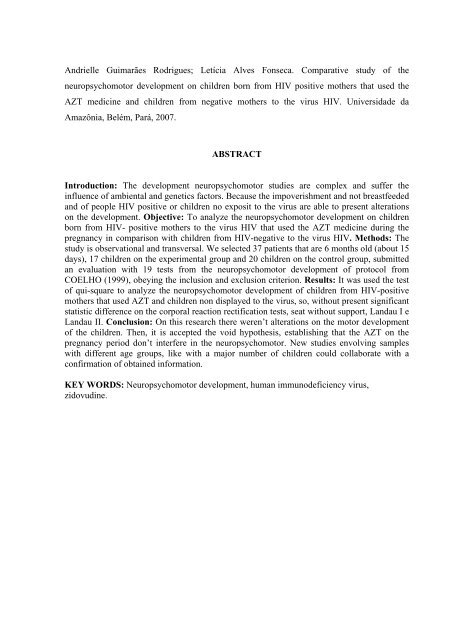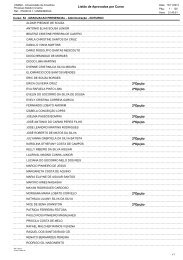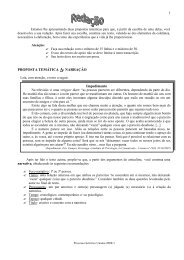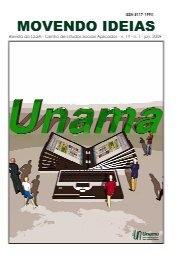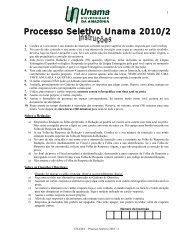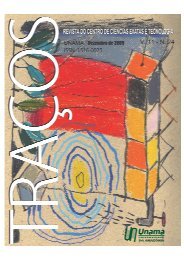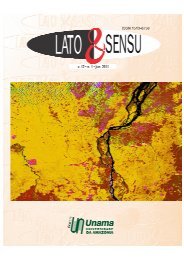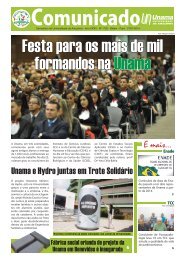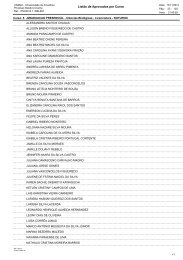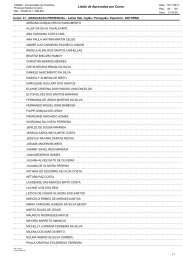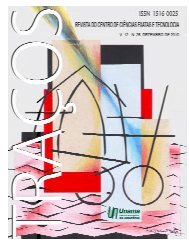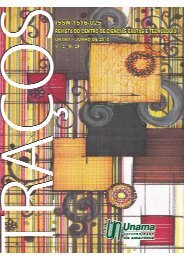Estudo comparativo do Desenvolvimento neuropsicomotor ... - Unama
Estudo comparativo do Desenvolvimento neuropsicomotor ... - Unama
Estudo comparativo do Desenvolvimento neuropsicomotor ... - Unama
You also want an ePaper? Increase the reach of your titles
YUMPU automatically turns print PDFs into web optimized ePapers that Google loves.
Andrielle Guimarães Rodrigues; Letícia Alves Fonseca. Comparative study of the<br />
neuropsychomotor development on children born from HIV positive mothers that used the<br />
AZT medicine and children from negative mothers to the virus HIV. Universidade da<br />
Amazônia, Belém, Pará, 2007.<br />
ABSTRACT<br />
Introduction: The development neuropsychomotor studies are complex and suffer the<br />
influence of ambiental and genetics factors. Because the impoverishment and not breastfeeded<br />
and of people HIV positive or children no exposit to the virus are able to present alterations<br />
on the development. Objective: To analyze the neuropsychomotor development on children<br />
born from HIV- positive mothers to the virus HIV that used the AZT medicine during the<br />
pregnancy in comparison with children from HIV-negative to the virus HIV. Methods: The<br />
study is observational and transversal. We selected 37 patients that are 6 months old (about 15<br />
days), 17 children on the experimental group and 20 children on the control group, submitted<br />
an evaluation with 19 tests from the neuropsychomotor development of protocol from<br />
COELHO (1999), obeying the inclusion and exclusion criterion. Results: It was used the test<br />
of qui-square to analyze the neuropsychomotor development of children from HIV-positive<br />
mothers that used AZT and children non displayed to the virus, so, without present significant<br />
statistic difference on the corporal reaction rectification tests, seat without support, Landau I e<br />
Landau II. Conclusion: On this research there weren’t alterations on the motor development<br />
of the children. Then, it is accepted the void hypothesis, establishing that the AZT on the<br />
pregnancy period <strong>do</strong>n’t interfere in the neuropsychomotor. New studies envolving samples<br />
with different age groups, like with a major number of children could collaborate with a<br />
confirmation of obtained information.<br />
KEY WORDS: Neuropsychomotor development, human immunodeficiency virus,<br />
zi<strong>do</strong>vudine.<br />
8


